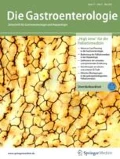Zusammenfassung
Die klinische Umsetzung des Prinzips der „zielgerichteten Therapie“ von Patienten mit metastasierten Tumorerkrankungen ist ein wesentlicher Fortschritt der internistischen Onkologie der letzten Jahre. Durch molekularpathologische Untersuchungen prädiktiver Biomarker können Patienten identifiziert werden, die auf eine bestimmte Therapie mit hoher Wahrscheinlichkeit ansprechen (positiv prädiktive Marker) bzw. nicht ansprechen (negativ prädiktive Marker). Traditionell histopathologisch definierte Krankheitsentitäten zerfallen so in biologisch definierte und therapeutisch unterschiedlich zu behandelnde Subgruppen. Wie in diesem Beitrag ausgeführt, weisen im Bereich der gastrointestinalen Tumoren die zielgerichtete Therapie und die molekularpathologische Diagnostik beim kolorektalen Karzinom und beim Magenkarzinom heute mit weitem Abstand den höchsten Stellenwert auf.
Abstract
The clinical implementation of the principle of targeted therapy in patients with metastasized tumors represents a substantial advance in oncology in recent years. Using molecular pathological investigations of predictive biomarkers patients can be identified who with a high probability will respond (positive predictive marker) or not respond (negative predictive marker) to a certain form of therapy. Traditional histopathologically defined disease entities then fall into biologically defined subgroups which must be treated differently for therapy. As described in this article, targeted therapy for gastrointestinal tumors and molecular pathological diagnostics for colorectal cancer and stomach cancer are by far the most important.




Literatur
Goffin JR, Zbuk K (2013) Epidermal growth factor receptor: pathway, therapies, and pipeline. Clin Ther 35: 1282–1303
Kim M-J, Lee HS, Kim JH et al (2012) Different metastatic pattern according to the KRAS mutational status and site-specific discordance of KRAS status in patients with colorectal cancer. BMC Cancer 12: 347
Malapelle U, Carlomagno C, Luca C de et al (2014) KRAS testing in metastatic colorectal carcinoma: challenges, controversies, breakthroughs and beyond. J Clin Pathol 67:1–9
Douillard J-Y, Oliner KS, Siena S et al (2013) Panitumumab – FOLFOX4 treatment and RAS mutations in colorectal cancer. N Engl J Med 369: 1023–1034
Fearon ER. (2011) Molecular genetics of colorectal cancer. Annu Rev Pathol 6: 479–507
Lindor NM, Burgart LJ, Leontovich O et al (2002) Immunohistochemistry versus microsatellite instability testing in phenotyping colorectal tumors. J Clin Oncol 20: 1043–1048
Moreira L, Balaguer F, Lindor N et al (2012) Identification of Lynch syndrome among patients with colorectal cancer. JAMA 308: 1555–1565
Weissman SM, Bellcross C, Bittner CC et al (2011) Genetic counseling considerations in the evaluation of families for Lynch syndrome – a review. J Genet Couns 20: 5–19
Laghi L, Malesci A (2012) Microsatellite instability and therapeutic consequences in colorectal cancer. Dig Dis 30: 304–309
Mouradov D, Domingo E, Gibbs P et al (2013) Survival in stage II/III colorectal cancer is independently predicted by chromosomal and microsatellite instability, but not by specific driver mutations. Am J Gastroenterol 108: 1785–1793
Thiel A, Heinonen M, Kantonen J et al (2013) BRAF mutation in sporadic colorectal cancer and Lynch syndrome. Virchows Arch 463: 613–621
Lochhead P, Kuchiba A, Imamura Y et al (2013) Microsatellite instability and BRAF mutation testing in colorectal cancer prognostication. J Natl Cancer Inst 105: 1151–1156
Palomaki GE, Bradley LA, Douglas MP et al (2009) Can UGT1A1 genotyping reduce morbidity and mortality in patients with metastatic colorectal cancer treated with irinotecan? An evidence-based review. Genet Med 11: 21–34
Boisdron-Celle M, Morel A, Gamelin E (2010) Dihydropyrimidine dehydrogenase deficiency and toxicity to fluoropyrimidine. Ann Biol Clin (Paris) 68: 27–32
Van Staveren MC, Jan Guchelaar H, Kuilenburg ABP van et al (2013) Evaluation of predictive tests for screening for dihydropyrimidine dehydrogenase deficiency. Pharmacogenomics J 13: 389–395
Caudle KE, Thorn CF, Klein TE et al (2013) Clinical pharmacogenetics implementation consortium guidelines for dihydropyrimidine dehydrogenase genotype and fluoropyrimidine dosing. Clin Pharmacol Ther 94: 640–645
Pazo Cid RA, Antón A (2012) Advanced HER2-positive gastric cancer: current and future targeted therapies. Crit Rev Oncol Hematol 85: 350–362
Einhaltung ethischer Richtlinien
Interessenkonflikt. M. Wiesweg erhielt Reisekostenunterstützung von Amgen und Roche. M. Schuler verweist auf Beratertätigkeit für Novartis und Roche sowie auf institutionelle Forschungsförderung durch Novartis. Dieser Beitrag beinhaltet keine Studien an Menschen oder Tieren.
Author information
Authors and Affiliations
Corresponding author
Rights and permissions
About this article
Cite this article
Wiesweg, M., Schuler, M. Molekulare Labordiagnostik bei gastrointestinalen Tumorerkrankungen. Gastroenterologe 9, 127–137 (2014). https://doi.org/10.1007/s11377-013-0851-6
Published:
Issue Date:
DOI: https://doi.org/10.1007/s11377-013-0851-6

